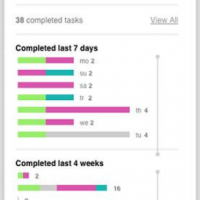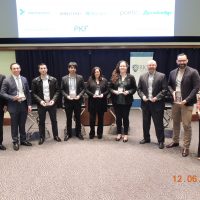We have found that every team is made up of two broad types of people– the Idea Makers and the Doers. If you’ve ever taken a Myers Briggs test, you might know these two groups as Judgers (J) and Perceivers (P).
Insights
There has been a lot of buzz recently about WOOP. No, not the sound you make when you’re really excited about something. We’re talking about W.O.O.P., a productivity solution developed by Dr. Gabriele Oettingen that provides a framework for accomplishing big goals one step at a time. W.O.O.P. stands for “Wish, Outcome, Obstacle, Plan,” and it outlines the four steps that make it most easy for you to actually accomplish your goals.
Since its inception, the CommandHound team has been collecting data from its users to see how they are using the software to drive accountability in their organizations and to learn from which feature they are getting the most value.
Across all of the industries in which CommandHound has been employed, these are the top three ways that it is being used most effectively.
The gig economy is here to stay. Intuit estimates that by 2020, as many as 40 percent of Americans will be contingent, or “gig” workers. Gig workers can be freelancers, independent contractors, or any other outsourced employees who are hired on a per-project basis.
Some of these contingent workers choose to work outside of a payroll system either as full-time freelancers or as part-time workers who supplement their income by picking up gigs. Others take contingent jobs out of necessity even though they would prefer full-time employee status.
It seems like nowadays everybody is talking about accountability in the workplace and how critical it is to make sure things get done. There are so many conversations about how hard it is to implement accountability and how hard it is to change the culture of the business so that it becomes a permanent change.
Have you ever found yourself in meetings where the same issues and action items seem to get discussed over and over?
If the mechanics of documenting action items, defining a due date, and assigning it to somebody are in place then, why don’t things get done? Why do we need to talk about them again at subsequent meetings? There are actually some very simple steps you can take to make sure that your meetings stay on track.
With such a huge proliferation of task management, getting things done (GTD) apps, and checklist software, it’s no surprise that many attempts have been made to try to simplify the evaluation and selection process.
But have you ever tried to find something in Capterra, one of the most comprehensive software catalogs out there? There are 50+ software solutions listed in each of the following categories: workflow management, task management, and project management.
How are you supposed to compare or evaluate what’s best for your specific situation?
A review of Todoist in PC Magazine has made it an “Editors’ Choice.” So, how does CommandHound take a popular to-do list app to the next level.
HOUSTON – (December 6, 2018) – CommandHound was recognized as one of the 10 Most Promising Digital Companies at the 2018 Texas Digital Summit hosted by the Rice Alliance for Technology and Entrepreneurship and Station Houston at Jones Graduate School of Business, Rice University on Dec. 6.
One of the ultimate perks available to CommandHound clients is the superior level of service that comes along with any CommandHound implementation.










